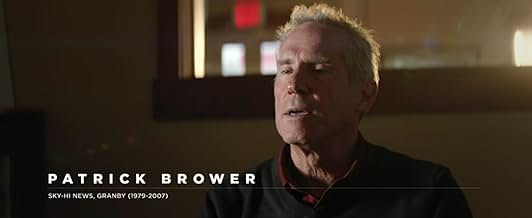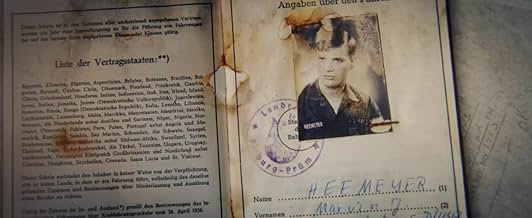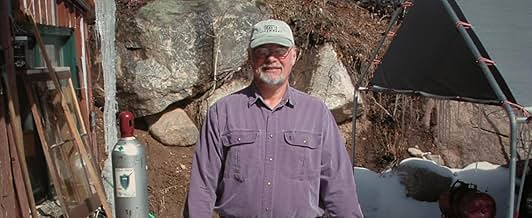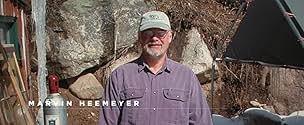Tread
- 2019
- 1h 29m
IMDb RATING
7.1/10
3.8K
YOUR RATING
Pushed to his breaking point, a master welder in a small town at the foot of the Rocky Mountains quietly fortifies a bulldozer with 30 tons of concrete and steel and seeks to destroy those h... Read allPushed to his breaking point, a master welder in a small town at the foot of the Rocky Mountains quietly fortifies a bulldozer with 30 tons of concrete and steel and seeks to destroy those he believes have wronged him.Pushed to his breaking point, a master welder in a small town at the foot of the Rocky Mountains quietly fortifies a bulldozer with 30 tons of concrete and steel and seeks to destroy those he believes have wronged him.
- Awards
- 1 nomination total
Marvin Heemeyer
- Self
- (archive footage)
Glenn Trainor Jr.
- Self - Grand County Undersheriff 1993 - 2004
- (as Glenn Trainor)
Cody Docheff
- Self - Owner, Mountain Park Concrete
- (archive footage)
Dick Thompson
- Self - Former Mayor of Granby, CO.
- (archive footage)
Ron Thompson
- Self - Vice President, Sewer District Board
- (archive footage)
- Director
- Writer
- All cast & crew
- Production, box office & more at IMDbPro
Featured reviews
"When you visit evil on someone, believe me, it will be visited on you." Marv Heemeyer
And so, you get to see the most bizarre documentary this year at a time when you may have had just enough of formulaic dramas on demand. Netflix brings us Marv, who is so pissed at the small town of Granby, Colorado, that he outfits a giant Kubota bulldozer like a tank and wrecks a serious number of buildings.
We don't remember this tragic and sometimes amusing incident from 2004 because we were grieving the day after for Ronald Reagan. Now, however, we can relive the bizarre event and give it its just due in Paul Solet's magnetizing documentary called Tread, for obvious reasons. I've lived in a small town like that (pop about 2000) where life can be unforgiving with slights remembered, rumors deadly, and good ol' boys rule not always to a working stiff's benefit.
It's not important to know who is right or wrong. Rather it is discouraging to know that neither side is right and that provincialism thrives as could be expected in blue collar enclaves where zoning and sewage district decisions are not made by God but by petty bureaucrats, who can change a modest welder's life to their advantage and his distinct outrage.
After setting the scene of growing acrimony, Solet shows original footage and voiceovers to chronicle the tank's journey, helicopter and drone shots, and a few restaged moments to try to replicate the eccentricity of the event. Marv's cassette tape testimony is the most interesting, for he barely reveals his rage in favor of his apocalyptic predictions. No one can stop the giant as it targets the buildings and homes of Marv's perceived enemies.
Working-class outrage does gets lost in sheer wonder at the forbidding destroyer, perhaps echoing our own numbed inability to stop a pandemic or a destructive political machine. Yet, as almost low-key as this revenge is, it is nonetheless true, and a bit of our outrage rides inside with Marv.
Tread seems to hold our abiding struggles as if in a nightmare where we tread on our perceived enemies and forget the lessons of tolerance our parlous times demand of us.
You'll not move from your seat in disbelief. It makes being cooped up worth while for 89 minutes.
And so, you get to see the most bizarre documentary this year at a time when you may have had just enough of formulaic dramas on demand. Netflix brings us Marv, who is so pissed at the small town of Granby, Colorado, that he outfits a giant Kubota bulldozer like a tank and wrecks a serious number of buildings.
We don't remember this tragic and sometimes amusing incident from 2004 because we were grieving the day after for Ronald Reagan. Now, however, we can relive the bizarre event and give it its just due in Paul Solet's magnetizing documentary called Tread, for obvious reasons. I've lived in a small town like that (pop about 2000) where life can be unforgiving with slights remembered, rumors deadly, and good ol' boys rule not always to a working stiff's benefit.
It's not important to know who is right or wrong. Rather it is discouraging to know that neither side is right and that provincialism thrives as could be expected in blue collar enclaves where zoning and sewage district decisions are not made by God but by petty bureaucrats, who can change a modest welder's life to their advantage and his distinct outrage.
After setting the scene of growing acrimony, Solet shows original footage and voiceovers to chronicle the tank's journey, helicopter and drone shots, and a few restaged moments to try to replicate the eccentricity of the event. Marv's cassette tape testimony is the most interesting, for he barely reveals his rage in favor of his apocalyptic predictions. No one can stop the giant as it targets the buildings and homes of Marv's perceived enemies.
Working-class outrage does gets lost in sheer wonder at the forbidding destroyer, perhaps echoing our own numbed inability to stop a pandemic or a destructive political machine. Yet, as almost low-key as this revenge is, it is nonetheless true, and a bit of our outrage rides inside with Marv.
Tread seems to hold our abiding struggles as if in a nightmare where we tread on our perceived enemies and forget the lessons of tolerance our parlous times demand of us.
You'll not move from your seat in disbelief. It makes being cooped up worth while for 89 minutes.
Greetings again from the darkness. If not so tragic, this story might fit best in Ripley's Believe it or Not. What better description is there for a small town welder who builds an armored bulldozer, weaponizes it, and then takes it on a rampage of revenge, destroying the buildings, homes, and businesses of those he believe 'wronged' him? This actually happened in Granby, Colorado in 2004, and that welder's name was Marv Heemeyer.
Filmmaker Paul Solet begins the film with a recording of a 911 call and news clips of the actual events of June 4, 2004. Solet then proceeds to lay out the backstory of Heemeyer, and how things escalated to the point where destruction and suicide seemed like the only logical step to him. Solet cleverly utilizes Heemeyer's own self-recording (via audio cassette) as a framing structure for the film. Heemeyer's voice tells us what his plan was, and why he had reached this level of desperation.
Interviews are key, and we hear from law enforcement officers who were on the scene that day, Heemeyer's ex-girlfriend Trisha MacDonald, his best friend, a younger man from his snowmobile club, brothers from a family that had supposedly targeted Marv, and a newspaper reporter, Patrick Brower, who also wrote a book on Heemeyer's rampage. Actual news clips and reenactments are used to show us what those being interviewed tell. In this case, it's an effective approach.
It's particularly interesting to hear that Marv was mostly a likable guy who just bumped up against local town and county politics a couple of times. Marv was not part of the 'good old boys club' and admits to needing to "teach a lesson" to those he perceived has gone out of the way to make life difficult for him. His bulldozer was a way for him to dole out the justice that was otherwise going unserved.
This is a story of revenge told in a somewhat sympathetic manner towards Marv Heemeyer, a man who considered himself "an American Patriot." The audio tape is clearly a confession of what he planned (and later carried out), and it was clear he knew this was a suicide mission. Listening to his rants, we assume some form of mental illness was involved, and his best friend describes him as a man who 'spent too much time alone."
The video clips of the carnage, and of the many law enforcement officials on the scene - all of whom were helpless to stop the bulldozer - are captivating and difficult to watch. Fortunately, after the fact, we know that no one died that day other than the man who was responsible. Marv, a man of "righteous anger", had his day of serving justice and rare 'Bulldozer Rampage' headline knocked off the front page one day later by a much bigger story.
Filmmaker Paul Solet begins the film with a recording of a 911 call and news clips of the actual events of June 4, 2004. Solet then proceeds to lay out the backstory of Heemeyer, and how things escalated to the point where destruction and suicide seemed like the only logical step to him. Solet cleverly utilizes Heemeyer's own self-recording (via audio cassette) as a framing structure for the film. Heemeyer's voice tells us what his plan was, and why he had reached this level of desperation.
Interviews are key, and we hear from law enforcement officers who were on the scene that day, Heemeyer's ex-girlfriend Trisha MacDonald, his best friend, a younger man from his snowmobile club, brothers from a family that had supposedly targeted Marv, and a newspaper reporter, Patrick Brower, who also wrote a book on Heemeyer's rampage. Actual news clips and reenactments are used to show us what those being interviewed tell. In this case, it's an effective approach.
It's particularly interesting to hear that Marv was mostly a likable guy who just bumped up against local town and county politics a couple of times. Marv was not part of the 'good old boys club' and admits to needing to "teach a lesson" to those he perceived has gone out of the way to make life difficult for him. His bulldozer was a way for him to dole out the justice that was otherwise going unserved.
This is a story of revenge told in a somewhat sympathetic manner towards Marv Heemeyer, a man who considered himself "an American Patriot." The audio tape is clearly a confession of what he planned (and later carried out), and it was clear he knew this was a suicide mission. Listening to his rants, we assume some form of mental illness was involved, and his best friend describes him as a man who 'spent too much time alone."
The video clips of the carnage, and of the many law enforcement officials on the scene - all of whom were helpless to stop the bulldozer - are captivating and difficult to watch. Fortunately, after the fact, we know that no one died that day other than the man who was responsible. Marv, a man of "righteous anger", had his day of serving justice and rare 'Bulldozer Rampage' headline knocked off the front page one day later by a much bigger story.
Just like the Michael Douglas movie "Falling Down", this tragic documentary presents the viewer with an average guy who gets kicked repeatedly and eventually has enough.
I don't think they did a very good job in this documentary exploring the aspect of what, if any, actual corruption was involved in the town's actions against Marv, which is an unfortunate omission. They just interviewed a few of them and we should take it on faith that these people are on the up and up, apparently. Anyone with a cynical eye towards our dear leaders know better than that.
One could only wonder what the narrative would be like in 2020 with rampant protests across the US. Would Marv be viewed as a "peaceful" protester, "peacefully" destroying a city while "peacefully" shooting at cops and "peacefully" trying to murder people he disagrees with? Is he an anti-hero in today's anti-cop/anti-government context?
Had the documentary been produced in the midst of today's (summer of 2020) news cycle, maybe they would have spun it different? Makes you think.
I don't think they did a very good job in this documentary exploring the aspect of what, if any, actual corruption was involved in the town's actions against Marv, which is an unfortunate omission. They just interviewed a few of them and we should take it on faith that these people are on the up and up, apparently. Anyone with a cynical eye towards our dear leaders know better than that.
One could only wonder what the narrative would be like in 2020 with rampant protests across the US. Would Marv be viewed as a "peaceful" protester, "peacefully" destroying a city while "peacefully" shooting at cops and "peacefully" trying to murder people he disagrees with? Is he an anti-hero in today's anti-cop/anti-government context?
Had the documentary been produced in the midst of today's (summer of 2020) news cycle, maybe they would have spun it different? Makes you think.
I believe Marv 100%. I grew up in a small town of 1100 people and anyone who grew up in a similar town knows these good old boys clubs exist without a doubt. There are 3 or 4 familys in these small towns and if you cross them, they will have you excommunicated and isolated and do whatever they can to smear your name. Marv had an extreme reaction to such an experience for sure and it's terrible that he did so, but anyone trying to act like his story doesn't hold any water at all is fooling themselves. These people undoubtedly pushed him and now want to act like they were innocent little lambs in all of it. Not buying it.
I don't know if what the man said about the people in the city was true, partly true or not true at all. These small cities owned by mostly one family are known to yield a lot of power. If it is true or partly true, what this man was saying, it just shows us that hurting people has consequences. I tend to believe what the man is saying was partly to mostly true.
It is a shame that our courts and laws do not protect us from people in power being able to take advantage of another.
With great power comes great responsibility!
It is a shame that our courts and laws do not protect us from people in power being able to take advantage of another.
With great power comes great responsibility!
Did you know
- TriviaMarvin Heemeyer posthumously attained the nickname "Killdozer" due to his rampage.
- ConnectionsReferenced in The Cinema Snob: Thunder Warrior (2022)
- How long is Tread?Powered by Alexa
Details
Box office
- Gross US & Canada
- $36,527
- Opening weekend US & Canada
- $10,585
- Feb 23, 2020
- Gross worldwide
- $36,527
- Runtime1 hour 29 minutes
- Color
Contribute to this page
Suggest an edit or add missing content



![Trailer [EN]](https://m.media-amazon.com/images/M/MV5BYmVkZTY0MmEtNzBiZi00NWI5LWJjOGEtZjhlMjhhZGI2MmQ5XkEyXkFqcGdeQXRyYW5zY29kZS13b3JrZmxvdw@@._V1_QL75_UX500_CR0)
































